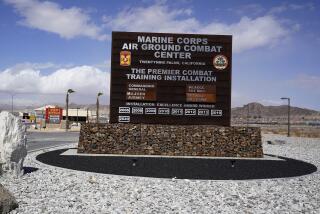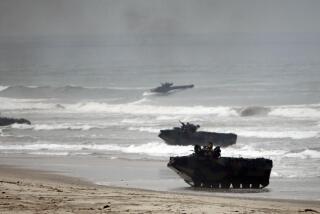Marines’ life-and-death decisions in the ‘fighting hole’
- Share via
Reporting from The Outskirts Of Marja, Afghanistan — The Marines of Charlie Company had just landed outside Marja and were itching for the fight with the Taliban when they learned that a group of Afghans with shovels and wheelbarrows were digging holes in the road nearby.
Were they planting explosives? You could never be certain, but the reconnaissance drones overhead thought so. Approval was given to fire a rocket at the men.
The rocket strike caused a thunderous explosion. The men dug their holes no more.
“It was pretty motivating,” said Cpl. Jonathan Lee, 30, of Orange Park, Fla.
--
Before the Marines from the 1st Battalion, 3rd Regiment moved to take over a key westbound route to Marja called Five Points, they were given a lecture by a combat lawyer about the rules of engagement, the strictures that determine when it’s lawful for a Marine to fire a weapon.
It’s a lecture the Marines have heard before -- that the inadvertent killing of civilians could undermine what they are attempting to accomplish. The motto is simple: Engage your brain before you engage your weapon.
“You don’t ever have to use force just because you have the authority,” said Capt. Paul Tetzloff, the battalion’s lawyer, who talked to the Marines just as they boarded helicopters. “You have to think of the bigger picture.”
--
As the sun poked up over Five Points, the Marines were peppered with fire from AK-47 assault rifles, none of it effective. Three Afghan men were arrested as suspects and two tested positive for gunpowder residue on their hands.
The three were handcuffed and blindfolded for transport to a detention facility at the battalion headquarters, Camp Geronimo. Two protested that they were innocent cabdrivers.
Later, village elders complained to Marine brass that the three had been wrongly accused.
Lt. Col. Matt Baker, the battalion commander, reluctantly agreed to release the three into the elders’ custody if they signed agreements to renounce any Taliban affinity.
--
The mantra of the Marine leadership is that the push into Marja is a team effort with the Afghan army. Several Afghan soldiers accompanied the Marines from the 1st Battalion, though very much as junior partners.
“Some are good, some not so good, some so-so,” said Staff Sgt. Joseph Wolfgeher of Raytown, Mo. “We try to put them forward as often as we can.”
As Marines unloaded equipment needed to build an outpost at Five Points, others manned “fighting holes” -- what the Army calls foxholes. Most of the Afghan soldiers sat in their trucks, with the engines running and the heaters at full blast.
--
The Marines stand guard all night, in the cold wind and rain. They peer into the darkness with special goggles. But no technology is perfect. Is that shape in the distance an insurgent sneaking up to fire a mortar round or a rocket-propelled grenade? Or just a confused farmer wandering in his own field, unsure what to make of these heavily armed men and the roar of warplanes overhead?
For all the lectures and points on the rules of engagement cards given to Marines, the final decision on whether to use deadly force might have to be made in a split second by a young Marine without time or ability to consult an officer or a sergeant.
Lance Cpl. Joe Saponaro, 20, thinks about the possibility of having to kill.
“I think I’ll get religious out here,” he said as he remained in his fighting hole. “You think about life and what it’s going to be like to take one.”
More to Read
Sign up for Essential California
The most important California stories and recommendations in your inbox every morning.
You may occasionally receive promotional content from the Los Angeles Times.













